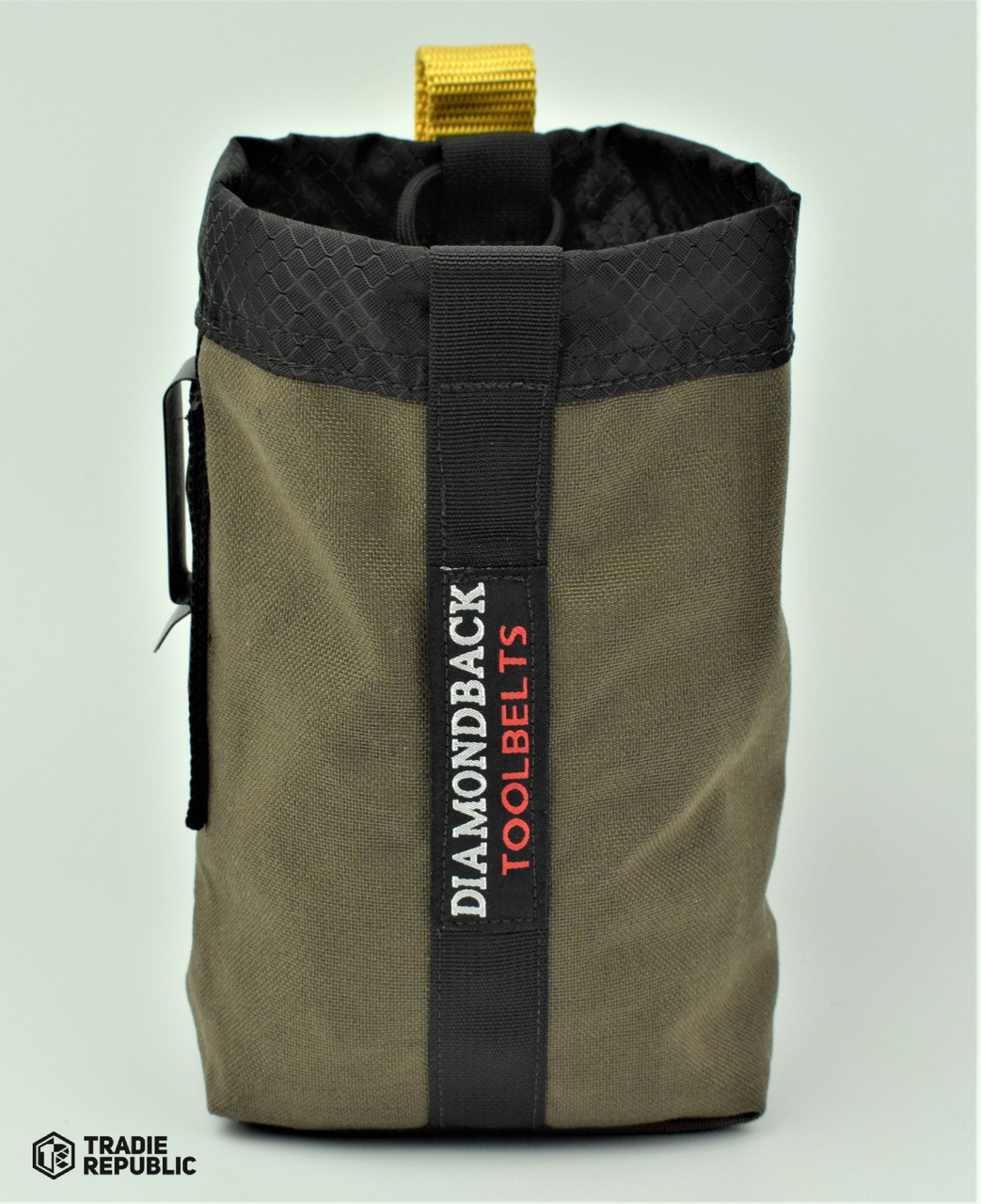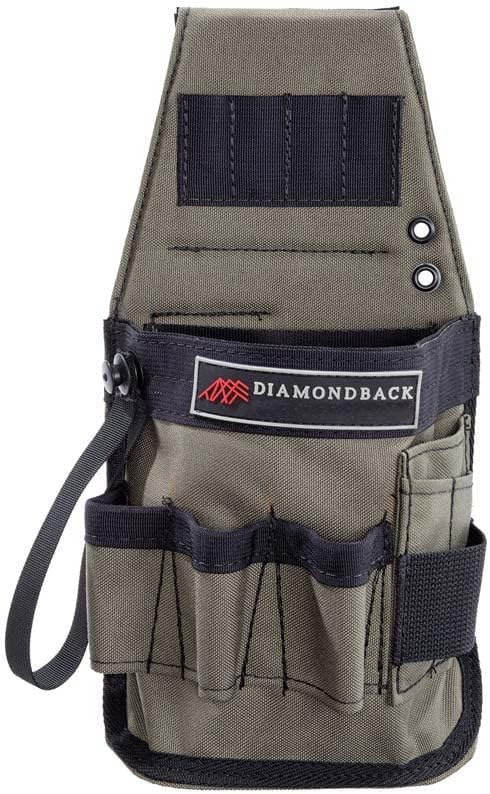For the dedicated professional in the trades, a tool bag isn’t merely an accessory; it’s an extension of their craft, a mobile workshop, and often, a silent partner enduring the rigors of demanding work environments. In a market flooded with options, one name consistently rises above the fray, synonymous with unparalleled durability, ingenious design, and unwavering ergonomic support: Diamondback Tool Bags. Far from being just another brand, Diamondback has cultivated a reputation as the definitive choice for tradespeople who refuse to compromise on quality, efficiency, and their own long-term well-being. This article delves into what makes Diamondback Tool Bags the gold standard, exploring their construction, ergonomic philosophy, modularity, and the undeniable return on investment they offer.
The Diamondback Philosophy: Built for the Best, By the Best
At its core, Diamondback isn’t just selling tool bags; they’re providing a complete system designed to optimize the workflow and protect the health of professional tradespeople. Their philosophy is rooted in a deep understanding of the challenges faced on job sites daily – the constant bending, lifting, reaching, and the sheer physical toll of carrying heavy loads of tools. This isn’t a company that churns out mass-produced, disposable gear. Instead, Diamondback embodies a commitment to American craftsmanship, engineering solutions that stand up to the harshest conditions while prioritizing the user’s comfort and efficiency.
They recognized a critical gap in the market: most tool belts and bags were either flimsy and quick to fail, or poorly designed, leading to back pain, fatigue, and decreased productivity. Diamondback stepped in to fill that void, creating a product line that is as robust as it is intelligently designed, transforming the way tradespeople interact with their tools. It’s an investment in a career, a testament to quality that resonates deeply with those who understand the value of reliable equipment.
Unrivaled Durability and Construction: Forged for the Field
The first, and perhaps most immediately striking, aspect of any Diamondback product is its sheer resilience. These aren’t bags that will fray at the seams after a few months or buckle under the weight of a full load. Diamondback tool bags are built like tanks, utilizing materials and construction techniques typically reserved for military-grade equipment.
The cornerstone of their durability is the choice of material: 1000D Nylon Cordura®. This heavy-duty, abrasion-resistant fabric is renowned for its exceptional strength-to-weight ratio and resistance to tears, scuffs, and punctures. Unlike lighter nylons or canvas, 1000D Cordura can withstand the constant friction, sharp edges, and general abuse inherent in construction and trade work. It shrugs off concrete dust, resists moisture, and maintains its structural integrity through years of relentless use.
But the material is only half the story. Diamondback’s construction methods are equally impressive. Every seam is reinforced with heavy-duty stitching, often utilizing bartacks and double-stitching in high-stress areas. Industrial-grade hardware – robust zippers, strong buckles, and metal D-rings – are chosen not just for their appearance but for their ability to withstand thousands of cycles and heavy loads without failing. This meticulous attention to detail means that a Diamondback tool bag isn’t just durable; it’s practically indestructible in the context of its intended use. It’s an investment that pays dividends over years, eliminating the constant need for replacements that plague users of lesser-quality gear.
Ergonomics and User Comfort: A Revolution in Support
Perhaps the most significant differentiator for Diamondback Tool Bags, and a primary reason for their fervent following, is their revolutionary approach to ergonomics. Traditional tool belts often distribute weight unevenly, pulling on the hips and lower back, leading to chronic pain, discomfort, and even long-term spinal issues. Diamondback directly addresses these critical health concerns.
Their belt systems, such as the Mamba or Maestro, are meticulously designed to conform to the natural curvature of the spine, providing superior lumbar support. This isn’t just about padding; it’s about structural integrity that helps maintain proper posture and evenly distributes the weight of tools across a larger surface area of the hips and lower back. The belts are often wider and thicker than standard options, preventing them from digging into the body.
Furthermore, Diamondback offers a range of suspender systems (like the Suspenders 2.5 or Ranger) that work in conjunction with their belts. These suspenders are engineered to take a significant portion of the load off the hips and transfer it to the shoulders, further optimizing weight distribution. They are fully adjustable, allowing tradespeople of different body types to achieve a custom fit that minimizes strain and maximizes comfort throughout long workdays. The padding on the shoulders and back is strategically placed to prevent chafing and discomfort, even when worn over extended periods.
The cumulative effect of this ergonomic design is profound. Tradespeople report significantly reduced back pain, less fatigue, and an overall improvement in their physical well-being. This isn’t just about comfort; it’s about extending careers, preventing injuries, and ensuring that professionals can perform at their best, day in and day out, without their gear becoming a source of physical detriment.
Modularity and Customization: Your System, Your Way
No two tradespeople are exactly alike, and neither are their tool requirements. Diamondback understands this perfectly, which is why their system is built on a foundation of unparalleled modularity and customization. Instead of offering one-size-fits-all solutions, Diamondback empowers users to build their ideal setup.
The core of the system is the robust belt, which serves as the platform for attaching a wide array of interchangeable pouches. These pouches come in various sizes and configurations, each thoughtfully designed for specific tools and tasks. From the large, general-purpose Denali to specialized pouches for electricians (e.g., the Electrician Pouch), framers (e.g., the Artisan), or finish carpenters (e.g., the Clavo), there’s a pouch for every need.
The attachment mechanism is secure and intuitive, allowing users to quickly add, remove, or rearrange pouches as their tasks evolve. This adaptability means that a tradesperson can carry only the tools they need for a particular job, reducing unnecessary weight and clutter. For instance, an electrician might swap out a large framing pouch for a more compact setup when doing finish work, or a carpenter might reconfigure their belt for a day of trim installation versus rough framing.
Beyond the pouches, Diamondback offers a range of accessories like hammer holsters, utility sheaths, and even innovative magnetic solutions to keep small fasteners easily accessible. This level of customization ensures that every tool has its place, leading to vastly improved organization, quicker access to tools, and ultimately, enhanced productivity on the job site. It’s a system that evolves with the user, rather than forcing the user to adapt to its limitations.
The Return on Investment: Why Premium Pays Off
The initial cost of a Diamondback Tool Bag system is undoubtedly higher than many mass-market alternatives. However, framing this solely as an expense misses the crucial point: a Diamondback system is an investment, not a disposable purchase. When considering the total cost of ownership, the value proposition becomes overwhelmingly clear.
- Longevity: While cheaper bags might need replacing every 6-12 months, a Diamondback system, with proper care, can last for many years, if not a decade or more. This dramatically reduces long-term replacement costs.
- Increased Productivity: An organized, comfortable, and efficient tool system means less time searching for tools, less time dealing with discomfort, and more time actively working. This directly translates to higher output and potentially higher earnings.
- Health Benefits: Avoiding chronic back pain, reducing fatigue, and preventing injuries means fewer doctor visits, less time off work, and a higher quality of life. The long-term health benefits alone can far outweigh the initial investment.
- Professional Image: Arriving on a job site with a meticulously organized and high-quality tool system projects an image of professionalism, reliability, and attention to detail. This can positively influence client perceptions and potential opportunities.
- Tool Protection: The robust construction of Diamondback pouches offers superior protection for valuable tools, preventing damage from drops, impacts, and the elements.
When these factors are weighed against the initial price, the decision to invest in a Diamondback system becomes a clear economic and professional advantage. It’s a tool that pays for itself many times over, not just in dollars saved, but in comfort, efficiency, and career longevity.
Conclusion: The Unyielding Ally for the Serious Tradesperson
Diamondback Tool Bags have transcended the realm of mere utility to become an indispensable partner for serious tradespeople across various disciplines. Their unwavering commitment to superior durability, groundbreaking ergonomic design, and unparalleled modularity sets them apart as the undisputed gold standard in the industry. They are not just carrying tools; they are carrying the future of efficient, comfortable, and healthy trade work.
For those who view their profession as a craft, who demand excellence from themselves and their equipment, and who understand that investing in quality is investing in their own success and well-being, Diamondback Tool Bags represent the ultimate choice. They are more than just bags; they are an unyielding ally, built to endure the toughest challenges, support the hardest workers, and ultimately, empower tradespeople to do their best work, day after demanding day.


